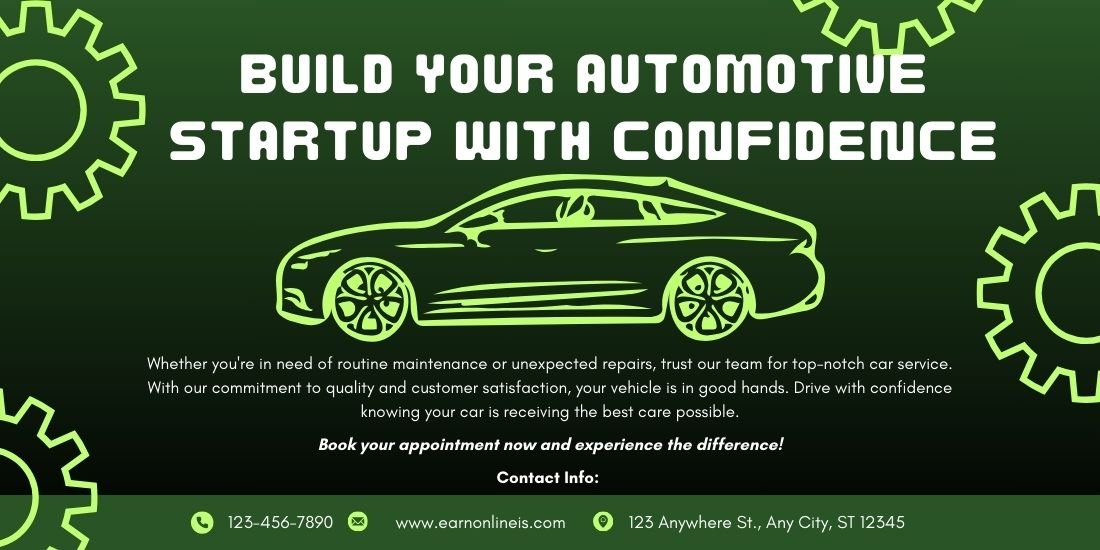Build Your Automotive Startup with Confidence
The automotive industry is undergoing a significant transformation, fueled by innovation, sustainability, and evolving consumer expectations. With the rise of electric vehicles (EVs) and advancements in autonomous driving, there are numerous opportunities for entrepreneurs eager to make an impact. To create a thriving automotive startup, you need a combination of vision, strategy, and effective execution. Here’s a comprehensive guide to help you confidently build your automotive startup with confidence and expand your automotive venture.
Understanding the Landscape
Understand the Industry Landscape
Before getting started, it’s essential to understand the current trends and challenges in the automotive industry. With the growth of electric vehicles (EVs), advancements in autonomous driving technology, and the rise of shared mobility solutions, there are plenty of opportunities available. However, the market is also highly competitive and subject to strict regulations.
Conduct thorough research on your target market. What needs are currently unmet? Are there any gaps in existing products or services? For example, startups like Rivian and Lucid Motors have found success by providing high-performance EVs with distinctive designs and features. Likewise, companies like Uber and Tesla have transformed the landscape of mobility and autonomous driving.
Being knowledgeable about industry trends will enable you to position your startup effectively and make informed decisions.
Define Your Unique Value Proposition
Differentiation is key in the automotive sector. With established companies already leading the market, your startup needs to present a unique value proposition (UVP) to make an impact. Your UVP could be an innovative product, an exceptional customer experience, or a novel business model.
For example, if your startup is centered around EVs, what distinguishes your product from others? Is it a longer battery life, quicker charging times, or affordability? If your focus is on software, can you offer a more user-friendly interface or improved cybersecurity for connected vehicles? Clearly define what makes your company unique and communicate it effectively.
Build a Strong Business Plan
A solid business plan is essential for any successful startup. It acts as your guide, helping you navigate through different phases of growth. Your plan should include:
- Vision and Mission: What are your long-term objectives, and what purpose does your company serve?
- Market Analysis: Understanding your target market, competitors, and industry trends.
- Product/Service Offering: A description of what you’re providing and the advantages it offers.
- Revenue Model: What strategies will you use to generate income? This could include direct sales, subscriptions, partnerships, or licensing.
- Financial Projections: A realistic estimate of your expenses, revenue, and potential profitability.
- Operational Plan: How will you produce, distribute, and promote your product or service?
Investors and stakeholders will seek a clear and persuasive business plan before they decide to support your venture. Crafting this plan not only instills confidence in your startup but also prepares you for any challenges that may arise.
Secure Funding and Resources
The automotive industry requires significant capital. Whether you’re working on an electric vehicle prototype or developing software for self-driving cars, obtaining sufficient funding is crucial. Consider various funding sources, such as:
- Venture Capital (VC): Reach out to VCs that focus on mobility or technology.
- Government Grants: Many governments provide incentives for green technology and innovation.
- Crowdfunding: Platforms like Kickstarter can help you assess interest and gather initial funds.
- Partnerships: Team up with established automotive companies for joint ventures or investments.
- Alongside financial backing, cultivate a network of trustworthy suppliers, engineers, and industry experts. Strong partnerships can speed up development and boost your credibility.
Focus on Innovation and Technology
Innovation drives the automotive industry forward. To keep your startup competitive, invest in the latest technologies. Depending on your area of focus, this could involve advancements in:
- Battery Technology: For electric vehicle startups, enhancing energy density and lowering costs are crucial.
- Autonomous Systems: Create AI and sensor technologies that enable self-driving features.
- Sustainability: Investigate recyclable materials, renewable energy solutions, or designs that produce zero emissions.
- Connectivity: Improve user experiences with smart features, such as voice assistants and real-time navigation.
Stay informed about emerging technologies and consider forming partnerships with tech companies or research institutions to tap into their expertise.
Build a Talented Team
A successful startup is built on a foundation of passionate and skilled individuals. Gather a team that aligns with your vision and offers a range of expertise. Essential roles may include:
- Engineers and Designers: To create and enhance your product.
- Business Strategists: To tackle market challenges and develop growth strategies.
- Marketing Experts: To establish your brand and draw in customers.
- Legal Advisors: To ensure adherence to industry regulations.
Cultivate a collaborative and innovative environment within your team. Encourage them to take ownership of their responsibilities and make meaningful contributions to the startup’s success.
Test, Iterate, and Scale
Before launching your product or service, perform comprehensive testing to guarantee it meets quality and safety standards. Collect feedback from early users and refine your offering based on their insights. Utilizing agile development processes, where you can quickly iterate and adapt, can be extremely beneficial.
Once your product is validated in the market, shift your focus to scaling operations. Broaden your reach, increase production capacity, and explore new markets or demographics. A well-thought-out scaling strategy ensures sustainable growth without stretching your resources too thin.
Define Your Niche
The automotive industry is extensive, so it’s crucial to concentrate on a specific niche. Some potential areas to consider include:
- Electric vehicle manufacturing
- Autonomous driving technology
- Vehicle connectivity and software solutions
- Aftermarket services and products
- Sustainable automotive materials
Selecting a niche helps focus your efforts and resources, making it easier to build expertise and attract customers.
Conduct Comprehensive Research
Market research is fundamental to any successful startup.
- – Industry Analysis: Examine market size, growth forecasts, and competitive landscape.
- – Customer Insights: Identify your target audience, their challenges, and preferences.
- – Regulations: Familiarize yourself with local and international automotive standards and compliance requirements.
Utilizing tools like SWOT analysis (Strengths, Weaknesses, Opportunities, and Threats) can assist you in evaluating the feasibility of your business idea.
Develop a Robust Business Plan
Your business plan should include:
- – Mission and Vision: Articulate your long-term objectives.
- – Market Strategy: Explain how you’ll position your brand, attract customers, and compete.
- – Financial Projections: Outline funding needs, revenue sources, and timelines for profitability.
- – Operations Plan: Detail your supply chain, manufacturing process, and delivery model.
Investors and stakeholders will closely examine this document, so make sure it’s comprehensive and realistic.
Secure Funding
Starting an automotive startup requires significant capital. Consider various funding sources such as:
- Angel Investors: Individuals who provide early-stage funding.
- Venture Capital: Firms that invest in high-growth startups.
- Government Grants: Many governments provide grants or subsidies for clean energy and automotive innovation.
- Crowdfunding: A practical option for startups with appealing consumer-focused ideas.
Communicate your value proposition to potential investors to earn their trust and financial backing
Build a Skilled Team
Put together a team with a range of skills and expertise, including:
- Automotive engineering.
- Software development.
- Marketing and sales.
- Business operations.
- Cultural fit is essential. Seek individuals who share your passion and vision.
Prototype and Test
Creating a prototype is a vital step in bringing your idea to life. Rigorously test it under various conditions to:
- Validate your concept.
- Identify areas for enhancement.
- Ensure compliance with industry standards.
- Collect feedback from experts, potential customers, and stakeholders to improve your product.
Focus on Branding and Marketing
Develop a strong brand that connects with your target audience. Key components include:
- Logo and Visual Identity: Maintain consistency across all platforms.
- Website and Social Media: Highlight your offerings and interact with customers.
- Content Marketing: Create blogs, videos, and whitepapers to establish your expertise.
- Partnerships: Team up with established brands to enhance credibility.
Scale Strategically
As your product starts to gain traction, consider the following growth strategies:
- Expand Operations: Invest in larger facilities and more advanced equipment.
- Broaden Your Market: Look into new geographic areas or different customer segments.
- Innovate Continuously: Keep ahead of trends and incorporate new technologies into your products.
Overcoming Challenges
The journey of launching an automotive startup comes with its share of challenges. Some common obstacles include:
- High Costs: Reduce expenses by forming partnerships and adopting lean manufacturing practices.
- Regulatory Compliance: Stay informed about regulations and consider hiring legal experts.
- Competition: Stand out by focusing on innovation and providing exceptional customer experiences.
- Talent Acquisition: Provide attractive benefits and create a positive workplace culture.
Conclusion:
Starting an automotive startup is both challenging and rewarding. By understanding the industry landscape, targeting a specific niche, building the right team, and following a clear strategy, you can confidently navigate the complexities of this field. Keep in mind that success in this fast-paced industry demands persistence, adaptability, and a strong commitment to innovation. With the right approach, your automotive startup can create significant change and achieve enduring success.










